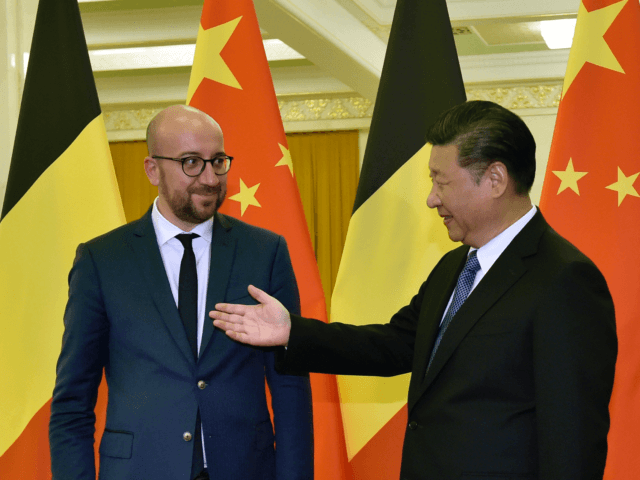The President of the European Council, Charles Michel, advocated for the European Union to push forward with the massive trade deal with Communist China, claiming it would help fight climate change.
On the final day of the Munich Security Conference EU Council President Charles Michel argued against offering an “olive branch” to Russia but declared that in order to accomplish the European Union’s green agenda goals it should seek deeper economic ties with Communist China — despite its long-list of atrocities and Beijing’s decision to personally sanction European politicians for speaking out against the “genocide” in Xinjiang.
While the top Eurocrat paid lip service to the idea that human rights issues should be addressed with China, he added that it is important for the EU to engage with countries around the world, even those who do not share the same “political model”.
“I feel that we must engage with countries like China if we want to make progress” on issues such as climate change and digital privacy rights, the former Belgian prime minister said, despite China being one of the worst offenders on both pollution and digital surveillance.
He also admitted that the EU was a “bit naive” in allowing Chinese and other companies to prosper within the bloc, while European firms were barred from markets in China. Michel argued, therefore, that the trade investment pact with China was necessary in order to receive “reciprocity” for European businesses in China.
Mr Michel said that he was “frustrated” by the fact that the trade deal was put on hold after Beijing levied sanctions against EU politicians, claiming that the deal “was and is a good step in the right direction”.
“It strengthens the possibilities for European companies to invest in China and it forces China to also to take steps on social rights, for example, and on the ILO [International Labour Organization],” he suggested.
Despite the Eurocrat’s claims, the €120 billion investment pact failed to mention human rights abuses in Xinjiang, Hong Kong, Tibet, or indeed throughout the entirety of mainland China. The deal also failed to require that China eliminate the use of modern slavery in its factories and fields, merely suggesting that China “work towards” implementing ILO standards on slave labour.
Though the use of slave labour in the concentration camp region of Xinjiang has been widely criticised, the practice is believed to be widespread throughout the communist country, with Uyghurs and other ethnic minorities being trafficked to other regions to work under dystopian surveillance.
‘Setback for the Free World’: EU Trade Deal with Communist China Draws Harsh Criticism https://t.co/CktU0dsAnG
— Breitbart London (@BreitbartLondon) January 5, 2021
Following the leadership of Lithuania, the EU has begun to take a somewhat harder stance on China, launching two disputes against Beijing at the World Trade Organization (WTO) over the past month. Yet major factions in Brussels and Berlin have been reticent to take on China, for fear of losing access to the lucrative market.
The EU-China Investment Pact was initially spearheaded by Germany’s Anglea Merkel, under whose leadership the economic engine of the European Union became so intertwined with China that Beijing has been Berlin’s top trading partner since 2018.
German firms have been at the forefront of trying to pressure Lithuania to back down from its conflict with the communist state over the opening of a de-facto Taiwanese embassy in Vilnius. Since December, Lithuanian products and components have been blockaded from China, meaning that companies that utilise Lithuania in their supply chains — notably German firms — have been impacted by the sanctions.
It has been alleged that numerous companies in Germany, including Volkswagen, Hugo Boss, Aldi, and BMW, have benefitted from using slave labour in Xinjiang.
Angela Merkel’s successor as chancellor, Olaf Sholz of the left-wing Social Democrat Party, reportedly used his first call with the Chinese dictator to pledge his support for putting the deal back on the table “as soon as possible”.
The European Council president has long been a supporter of closer relations with Communist China. Following President Joe Biden’s botched withdrawal from Afghanistan, Mr Michel took it upon himself to announce that the EU would not be “held hostage” by the rivalry between the United States and China.
“There is no doubt that we share the same democratic values and the same political model as the United States. At the same time, we must develop — as Europeans — our own strategy regarding China, which is a global power,” Michel said.
The Chinese state overtook the United States as the European Union’s top trading partner in 2020, as ties between Brussels and the communist dictatorship in Beijing continue to deepen. https://t.co/RzgCixukoq
— Breitbart London (@BreitbartLondon) February 17, 2021
Follow Kurt Zindulka on Twitter here @KurtZindulka

COMMENTS
Please let us know if you're having issues with commenting.